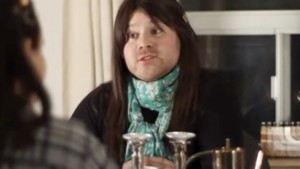Shtus Jews Say: Jewish Memes, Jewish Identities
Remember the “Shit People Say” videos that flooded our Facebook and Twitter feeds last year? The original Shit Girls Say featured a man dressed as a women saying quotes that a well-off, not-so-smart young woman might say. The video went viral, and within days there were dozens of parodies, focusing on men and women of various minority groups, including gay men, vegans, Asian dads, New Yorkers, and Ron Paul supporters. Just as genes mutate, a few weeks later this meme spawned a related meme, Shit White Girls Say to Black Girls. According to its creator, Franchesca Ramsey, its goal was “to make all people laugh while, hopefully, opening some eyes and encouraging some of my white friends and acquaintances to think twice before they treat their black friends and associates like petting zoo animals or expect us to be spokespeople for the entire race.”
Predictably, there were several Jewish versions as well, some of which reveal much about how American Jews see themselves in relation to each other and to the society in which they live. Like the original video, some of these featured men poking fun at women’s supposed lack of skill with technology and love-hate relationship with food. Several of them also reference and reproduce old stereotypes of Jewish women, like the lazy, wealthy, materialistic “JAP” and the overprotective Jewish mother. For example, in Shit Jewish Girls Say (below), the actor lifts the smallest weights in the weight room and says, “Uch, I’m shvitzing. Can someone help me? Can you do this for me?” In Shit Jewish Mothers Say, the mother (played by her son) says, “Where are you going? I want you to call me as soon as you get to the airport. If you don’t go to temple, you don’t leave the house at all.”
Of course, many people cringe at Jews invoking negative stereotypes in a public forum like YouTube. Many others might wonder whether they are even still relevant today. Clearly, however, some contemporary Jews feel secure enough to make fun of themselves for the world to see, and these stereotypes apparently still resonate enough for the presumably Jewish creators of the videos to highlight them and for hundreds of thousands of web-surfers to watch them. In the many comments on these videos, visitors — some identifying themselves as Jewish or not — debate how accurate, funny, or offensive they are. Some recognize themselves or people they know. Others express concerns like this: “This video will be bait for the anti semites on you tube, made by a self hating jew im guessing.” And indeed, some comments do include anti-Semitic slurs like “kike,” talk about Jews controlling the media or Hollywood, or references to the Arab-Israeli conflict.
In general, we assume that the videos’ creators are Jewish, although in most cases we have no definitive evidence (some videos specifically identify their makers as Jewish; most do not). If viewers found out that the creator of a stereotype-filled “Shit Jews Say” video was not Jewish, they would likely be up in arms. Notice, however, that the same is not true of men donning wigs and invoking stereotypes about women. In response to this, a pair of young Jewish women created Shit Jewish girls say with quotes like, “People are so stereotypical about Jews” and “Those ‘Shit Jewish Girls Say’ videos on YouTube are so inaccurate.” Even so, this and other videos created by Jewish women reproduce some of the same stereotypes as the videos created by men. They depict girls as materialistic, eating a lot and regretting it, and being overly concerned about their appearance — especially their distinctly Jewish physical features. Whereas the videos created by men come across as more offensive — one depicts a woman banging on her steering wheel and crying for daddy to call the auto club — the ones created by women are certainly not free of stereotypes.
The Jewish-themed videos do more than just highlight longstanding images of Jewish women; they also showcase new ones. These include women discussing plans to go on Birthright Israel, wearing a tallis and kippah, saying a Hebrew bracha, expressing ambivalence about intermarriage, studying Hebrew texts, preparing for Shabbos, eating latkes or hummus, and idolizing actresses Natalie Portman and Lea Michele. The videos also point to diversity among Jewish women (and men). Groups portrayed include Persian Jewish girls, Syrian Jews, Orthodox men, Yeshivish kids, frum girls, frum girls, and more frum girls. It is interesting to note that many of these are labeled with the names of Jewish subgroups, while the videos portraying well-off, non-Orthodox, white, presumably Ashkenazi Jews are not. This parallels not-specifically-Jewish videos: those portraying well-off white women with unmarked accents are labeled “girls,” while those portraying people of other ethnic and minority groups are given more specific labels, like “black girls,” “Armenian girls,” “nerdy girls,” “gay Republicans,” and “Saskatchewanians.” By discussing some Jews in an unmarked way, Jews — both those in the majority and those in minority subgroups — participate in our society’s discourse surrounding ethnicity, which privileges certain groups over others.
Interestingly, a wide variety of organizations produced SH#T-People-Say videos as promotional materials. These include Birthright Israel (Sh#t Birthrighters Say includes “Oh my God, the soldiers on my program are so hot.” “Where are all the camels?” and “I can’t do the hike- I have a scab” — the video also ends with an ad for a Birthright tour provider), Chabad (Stuff Chabad Rabbis Say: “You wanna give tzedakah? There’s an ap for that.” “Larry! From now on we’re gonna call you with your Jewish name: Yechiel Michl Shloyme Moyshe.” “What? BLT? Bagels, lox, and tefillin?” — the video ends with an ad for a Chabad Shabbaton at Texas A&M University) and even actress Mayim Bialik’s organization promoting kosher veganism. Political organizations have joined in as well. Sh*t People Say About Israel, posted by Students for Israel and funded by the David Project, includes quotes like “Israel uses ‘unproportionate’ force against the Palestinians,” “Jews have no connection to the land of Israel,” and “I think we should boycott hummous.” Shit Zionists Say, (below), created by members of Existence is Resistance surrounding a conference on boycotts, divestment, and sanctions, includes quotes like “There is a Palestinian state already; it’s called Jordan!” “Your family was killed in the Holocaust; how could you be a Nazi collaborator?” and “What is this Palestine? There was no Palestine on the map of Israel in my Sunday school class.”
Jewish organizations also used videos for more lighthearted purposes. Several synagogues and schools created spoofs as part of their 2012 Purim shpiels, such as Sht*ck People Say to Independent Minyaners, S!@# Ikar People Say, and Shtus Maimo Kids Don’t Say. These videos are filled with insider jokes, lampooning personalities and practices associated with these institutions, and most did not spread far, based on the number of hits.
Another video released just before Purim offered more biting commentary: Shtick Yeshivish People Say At Shivas is a litany of things inappropriate to say in a house of mourning. After Purim, just when this meme seemed to be on its way out, a few men in an Orthodox community in Waterbury, Connecticut, created Stuff People Say on Pesach, poking fun at the excessive preparations frum Jews make in advance of Pesach. The popularity (over 90,000 hits each) of these two clever twists on the meme suggests the role of tight-knit Orthodox networks in spreading Orthodox-oriented popular culture. (Unsurprisingly, videos created by Orthodox Jews, as well as by synagogues and schools, tend to avoid profanity in their titles, sometimes substituting Yiddish words, as in Shtus Torah High Girls Say and Shtick Yeshivesh Kids Say.)
Perhaps the most interesting of the Jewish sh#t subgenres are those which, like “Shit White Girls Say to Black Girls,” satirize the relations between Jews and non-Jews, as well as various groups of Jews. The most popular of these is by far Allison Pearlman’s Shit Christians Say to Jews (over 1 million hits), in which an actress that we assume is Jewish portrays a non-Jewish friend or roommate making insensitive comments: “You’re like really pretty for a Jew.” “God I love your curly hair. Can I touch it?” “Oh my God, you totally got jewed with the Santa Claus thing.” “Hey, what do you call a Jewish church? Well, do you want to go to real church with me?” A much less-viewed version, Stuff People Say to Jews, depicts similar interactions from a man’s perspective. A girlfriend, a red-neck man, and strangers in a bar say things like: “Your nose isn’t that big.” “I saw a penny on the ground today, but I didn’t pick it up. Are you mad?” And a particularly memorable scene: a man in a bar dons a yarmulke and says to the non-pictured Jewish man, “Twinsies!” – a quote from the original “Shit Girls Say” and “Shit White Girls Say to Black Girls” videos.
Like the videos discussed above, these also touch on stereotypes about Jews as rich but cheap and point to Jews’ distinctive appearance, food, holidays, religious practices, and language. Taking cues from “Shit White Girls Say to Black Girls,” these videos critique the insensitive and anti-Semitic comments many Jews receive. They also point to the close relations between Jews and non-Jews; the non-Jews feel close enough to the non-pictured Jews to touch their hair, ask personal questions, and make offensive comments. In a similar vein, Shit Jews Say to Christians points to the close relations between the groups from the other perspective. The (presumably Jewish) actor speaks to a non-pictured Christian friend: “Is everyone in your family blond?” “Are you sure I’m allowed in your country club?” “I’m losing my appetite- he’s nailed to the cross!” Like the two discussed above, this video plays on differences in appearance and culture and the stereotype of Jews as cheap. But it also touches on Jews’ insecurities based on historical discrimination and squeamishness about Christian symbols.
Some comments about Shit Christians Say to Jews suggest that interactions like these are a relic of the past, and others affirm their currency outside of major metropolitan areas: “I’m a Jew living in the middle of the bible belt… Every single one of these has happened to me.” Videos like these not only point to Jewish diversity, they also spark conversation about prejudice and inter-group relations.
In an outtake at the end of “Shit Jewish Girls Say: Episode 3,” the actor says, “Only Jews would get this.” Certainly that is true for some references in all of these videos, but their insider nature gives them widespread appeal, just as videos portraying Bengali moms, Mormons, and mixed kids offer outsiders a window into those cultures. The fact that Jews, including Orthodox Jews, create videos like these indicates that they are tapped in to popular culture online. And it shows that some Jews feel secure enough to portray longstanding stereotypes in the public domain. Indeed, while this essay focuses on Shit Jews Say, these points also apply to Jewish versions of My New Haircut, Call Me Maybe, and Gangnam Style. As future memes develop, Jews will doubtless continue to participate, using them as an opportunity to highlight their distinctiveness and connect with their wider multicultural context precisely by doing so.
![[the current issue of ZEEK]](../../image/2/100/0/5/uploads/leftistethicistgraphic-52842c6a.png)
- 5000 Pages of Zeek
- Founded in 2001, Zeek was the first Jewish online magazine, and we have over 5000 pages online to prove it, all available free of charge. Read more in the Archive.
More articles in
Arts and Culture
- Euphoria, Curiosity, Exile & the Ongoing Journey of a Hasidic Rebel: A Q & A with Shulem Deen
- Poet Q, Poet A: Jews Are Funny! Six Poets on Jewish Humor, Poetry & Activism and Survival
- Tackling Hate Speech With Textiles: Robin Atlas in New York for Tu B’Shvat
- Fiction: Angels Out of America
- When Is an Acceptance Speech Really a Speech About Acceptance?




